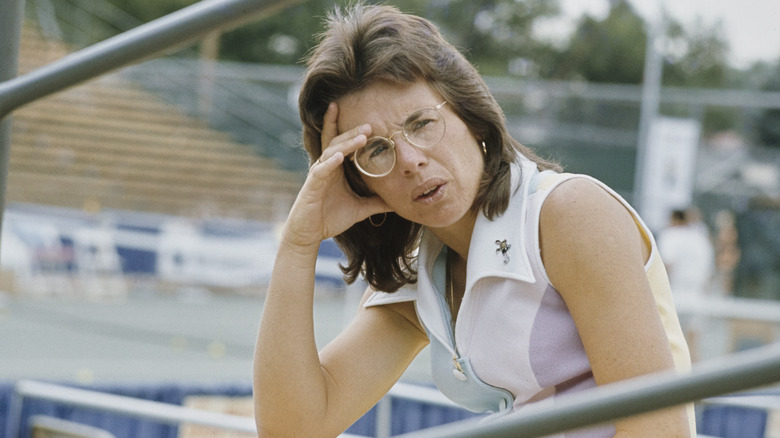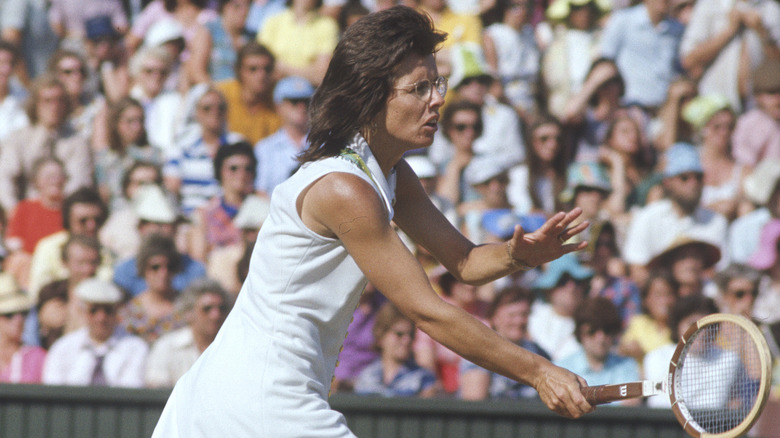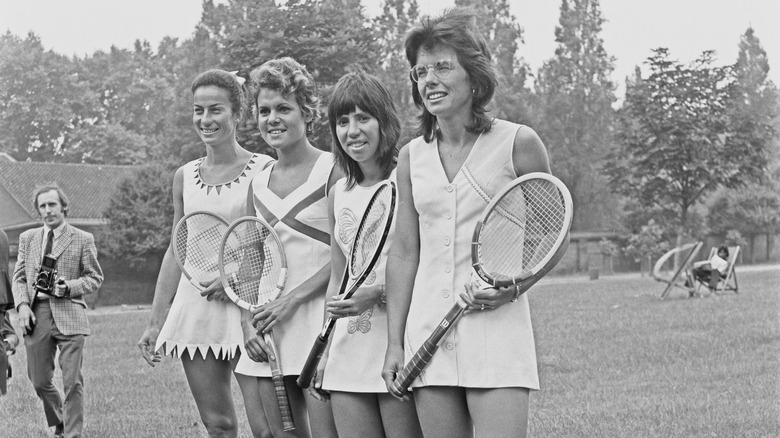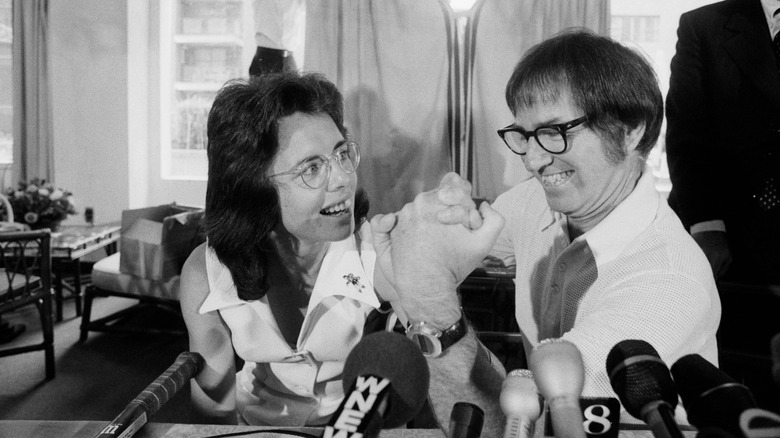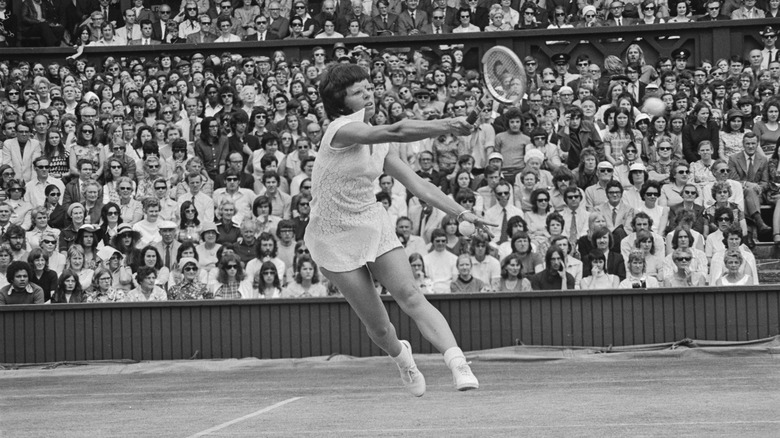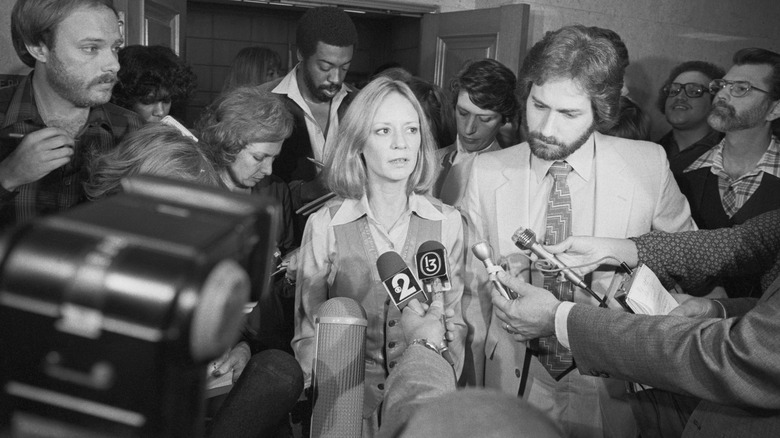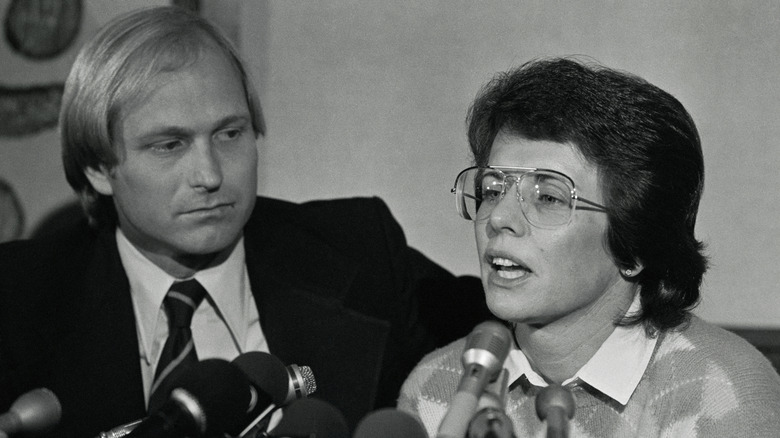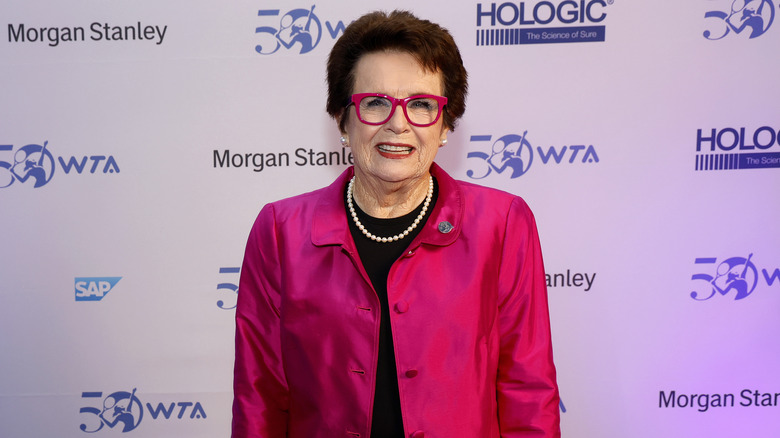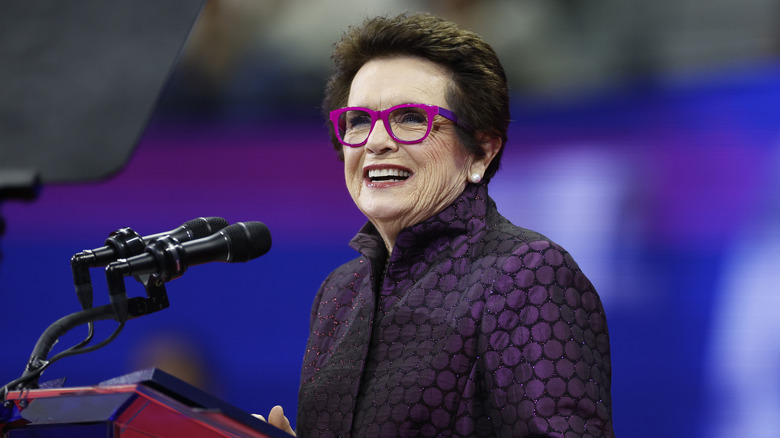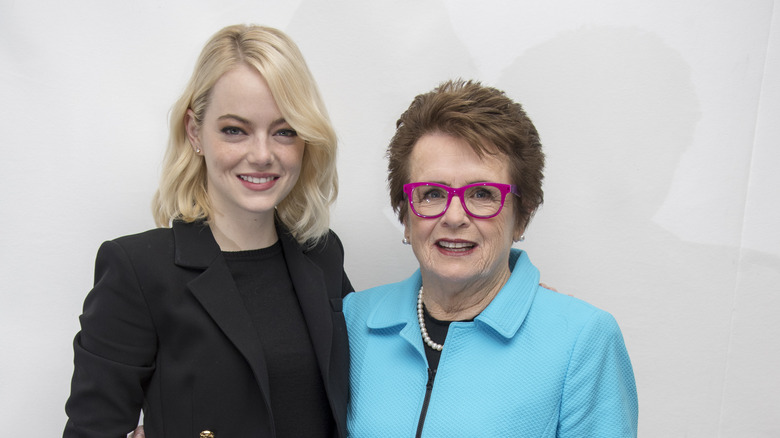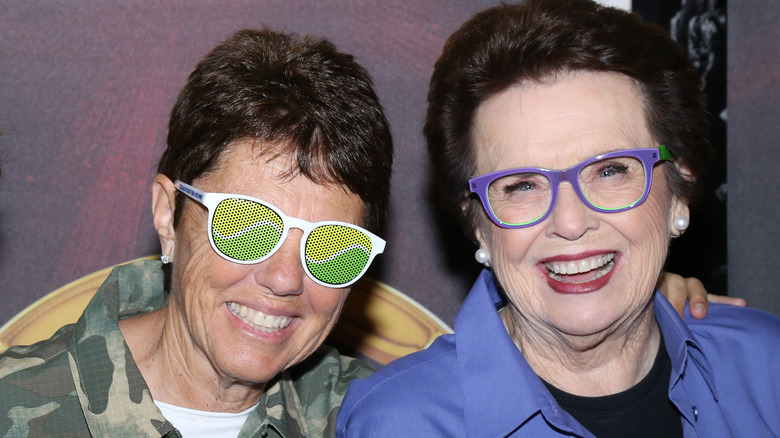Tragic Details About Billie Jean King
We may receive a commission on purchases made from links.
Billie Jean King is one of the world's most famous tennis players. While she is perhaps best known for her 1973 "Battle of the Sexes" tournament win against Bobby Riggs, King also broke other barriers through her status as the number one tennis player in the world for several years. The award-winning tennis legend not only helped inspire more women to play tennis but, as a member of the LGBTQ+ community, she is also known for her social rights and justice activism.
However, such efforts were not always regarded positively, and King's identity had some negative repercussions decades ago when American society was just starting to accept LGBTQ+ communities. King has faced several challenges throughout her life, many of them on a public scale due to her status as a famous professional athlete. Despite these tragic moments, King, who has retired from tennis, remains active in numerous associated efforts, such as World Team Tennis and the Women's Sports Foundation.
She was punished for her tennis skills as a child in school
Billie Jean King was athletic from a young age, a trait that seems to run in her family. Born Billie Jean Moffitt, King's parents were also athletic. Her mother, Betty, was a swimmer, and her father, Bill, was into basketball. Her younger brother, Randy, also grew up playing sports and was later a Major League Baseball pitcher.
Still, pursuing tennis as a child wasn't easy at first. According to her autobiography "All In," King described an incident where she wasn't allowed to compete in a tennis tournament despite being a good student. She wrote that the school principal "wouldn't sign a permission slip to excuse me for a week-long tennis tournament until my mom went to the school office and said, 'My daughter is a straight-A student. What could possibly be the problem?'" King detailed other incidents during her childhood, including a teacher lowering her grade because of the way she would supposedly "take advantage of her superior ability" during physical activities and games at school.
At 11 years old, she was punished for not wearing stereotypical female tennis gear
Despite being punished for her athletic capabilities and interests as a child, Billie Jean King continued her pursuit of tennis. King first took up tennis thanks to her father's suggestion. From there, she was formally introduced to what would be her favorite sport by a close friend. She fell in love with tennis almost immediately and even told her mother that she wanted to be the best player in the world.
However, in addition to being punished for her athleticism by school officials, King also faced sexism on the court. In a particularly embarrassing incident in 1955, King was shamed at an event at the Los Angeles Tennis Club over her attire that was perceived as inappropriate for her gender. As she explained in her autobiography "All In," it was all attributed to "the local tennis official at my first tennis tournament, Perry T. Jones, who turned heads by yanking me out of a group photograph when I was eleven years old because I was wearing white shorts, not a white skirt or white tennis dress."
She endured sexism early in her career
In her autobiography "All In," Billie Jean King also detailed how the sexism she faced as a child tennis player worsened as she got older. This included remarks about her appearance and criticisms that she wasn't feminine enough, starting when she was a teenager. According to an excerpt published by the New York Post, one of King's coaches called her "ugly" and suggested this would help her go far in her tennis career. She was just 15 years old at the time.
King also faced sexism from male tennis players who questioned why a woman would want to play the game. These events ultimately led to the famous "Battle of the Sexes" tournament against tennis player Bobby Riggs, a self-claimed male chauvinist who wanted to prove that tennis was a men's sport, claiming that "the man is supreme. While King was reluctant to face off against Riggs at first, she gave in after she realized she needed to prove him wrong. The famous tournament took place in September 1973, and King beat Riggs in three straight sets. "I thought it would set us back 50 years if I didn't win that match," King said, according to her personal website. It would ruin the women's [tennis] tour and affect all women's self-esteem. To beat a 55-year-old guy was no thrill for me. The thrill was exposing a lot of new people to tennis."
She had an abortion that was made public by her husband without her consent
In 1971, Billie Jean King decided to terminate her pregnancy, which her then-husband, Larry King, agreed with. As if the situation weren't sensitive enough, Billie Jean described California's laws at the time that required her to go before a medical committee to explain why she wanted an abortion. "Explaining to a panel of ten or fifteen strangers why I qualified for an abortion was probably the most degrading thing I've ever experienced," Billie Jean wrote in her autobiography "All In," as reported by the New York Post. Before she was allowed to undergo the procedure, King was also required to have Larry sign a permission slip.
To make matters worse, Larry disclosed the 1971 abortion to Ms. magazine as part of a pro-choice series the publication ran in 1972. While Larry claimed that he wanted to help raise awareness around the issue, the problem is that he gave the publication Billie Jean's name for the story without her consent. It was an ironic situation that Billie Jean's name was used for a feminist story in a feminist publication, yet was being manipulated in a patriarchal manner.
She was publicly outed by her girlfriend in 1981
While Billie Jean King was finding success in her career, she was coming to terms with her sexuality. She had been married to her husband, Larry King, for several years before beginning a relationship with her personal assistant, Marilyn Barnett, in the early 1970s. This was a secret King kept until Barnett retaliated against her over their breakup about a decade later. In 1981, King was ultimately publicly outed by Barnett, which led to both professional and personal repercussions. She even lost all of her corporate endorsements which were likely a large source of her income.
Despite the fact that she was publicly outed for her interest in women, King seized this difficult time as an opportunity to open up about her identity. This was all in spite of the fact that American society was not largely supportive of LGBTQ+ communities at the time. Her lawyer advised her to deny that she was a lesbian, but King refused. In an interview with NBC News, King recalled of that time, "I said: 'I'm going to do it. I don't care. This is important to me to tell the truth.'"
Since her public outing, King has become an important voice in the LGBTQ+ community. She also told NBC News, "Unless somebody's ready, they shouldn't be outed ... You are going to make it, but the most important thing is, I think, is first you gotta feel safe, and you need to have allies with you."
Billie Jean King was sued by Marilyn Barnett that same year
At the same time Billie Jean King was outed by her former girlfriend, Marilyn Barnett, King also faced legal troubles over their breakup. According to Newsweek, Barnett sued King in 1981 and sought monetary damages under "palimony" law, which separates assets for non-married couples. However, Barnett ultimately lost this claim, due to the fact that there were no protections for LGBTQIA+ couples at the time.
In her lawsuit, Barnett claimed, per documents obtained by The New York Times, "On or about May, 1972, in Los Angeles, Calif., plaintiff and King met and began dating on a regular basis. Sexual intimacy between Ms. Barnett and Mrs. King commenced approximately six months after their first date" and that she had quit her job as a hairdresser to do "all other things necessary so that Mrs. King's energy could be totally directed toward playing tennis." As such, Barnett sought money for King and her husband to support herself, as well as a share of their Malibu home.
The lawsuit affected King not only personally, but also professionally. By 1981, King was ready to retire from playing tennis, but she had to work longer in order to pay for her legal bills. The loss of her endorsements also didn't help her financial woes.
Billie Jean King later revealed her struggles with an eating disorder
The emotional toll of the events surrounding her public outing and her damaged career took an emotional toll on Billie Jean King. She later revealed struggles with binge eating disorder. "I ended up with an eating disorder that came from trying to numb myself from my feelings," King was quoted by Bleacher Report as describing her struggles. "I needed to surrender far sooner than I did." This was later revealed as binge-eating disorder, which she was diagnosed with at the age of 51.
According to the National Institute of Diabetes and Digestive and Kidney Diseases, binge eating disorder is the most common type of eating disorder in the U.S. It also affects adult women more than adult men, with an estimated 1.25% of the female population impacted. It's characterized by eating large amounts of food in a short amount of time, along with a loss of control. "I have an eating disorder; I was a binge eater," King explained in her autobiography, as quoted by Express. "I don't binge eat anymore, but for about 10 years, I was being very cruel to my poor little pancreas."
If you need help with an eating disorder, or know someone who does, help is available. Visit the National Eating Disorders Association website or contact NEDA's Live Helpline at 1-800-931-2237. You can also receive 24/7 Crisis Support via text (send NEDA to 741-741).
She was diagnosed with type 2 diabetes in 2007
In 2007, Billie Jean King faced another health scare when she was diagnosed with type 2 diabetes. "It's a wake-up call but I also knew from some of the people around me that you can live a great life," she was quoted by Express as saying about her diagnosis. She also was reportedly not shocked by her diagnosis, due to the fact that diabetes runs in her family.
Still, despite the family health history possibly factoring into her own type 2 diabetes diagnosis, King was still faced with an ultimatum about her health. She decided to take up the challenge and make concrete changes, such as reducing her carbohydrate consumption, exercising more, and seeking diabetes treatment. King has also worked to raise awareness about the condition, particularly encouraging children to lead more active lives.
Later, the COVID-19 pandemic also interfered with her ability to seek medical care for her condition. In regards to getting her blood checked, she explained in a 2020 interview with Self, "I've debated more than I usually do [about going in]." To make sure your type 2 diabetes treatment plan is working, doctors often require routine checkups and lab work to ensure your glucose is at a healthy level.
A 2017 movie about her life was criticized for a lack of authenticity
A movie about Billie Jean King called "Battle of the Sexes" was released in 2017 to much anticipation. As the title suggests, the movie focused on King's famous tennis match against Bobby Riggs. Emma Stone, who has undergone a stunning transformation, played King, while Steve Carrell played Riggs. Of Stone's portrayal, King told Sports Illustrated, "It was amazing. Her mannerisms, her voice. If I close my eyes, I would have thought it was me." Stone was humble about her role, telling the publication in the same interview that, while she was nervous about portraying such a legendary figure as King and didn't think she could do her justice, she was nevertheless excited to tackle the tennis icon. "Just getting to know about her life and her story and what makes her her, it was just an honor," she said.
However, while intended to be a biography, the film fell short of expectations for some viewers and critics. Film critic Brian Tallerico wrote in a review published on Roger Ebert, "It's not a 'bad' film, but Billie Jean King's story could have been so much deeper. It's a movie that doesn't hit nearly as hard as she did ... Instead of a timeless story, this feels like a Hollywood production that softens what was truly and genuinely a battle, one that women are still fighting today." Others also criticized the movie for its portrayal of King's relationship with Marilyn Barnett, which Newsweek said was "much more toxic than the film suggests."
A children's book about her life was pulled from a Florida school district in 2023
In 2019, a well-known children's series called "Ordinary People Change the World" published a biography about Billie Jean King. The book, "I am Billie Jean King," which was written by Brad Meltzer and illustrated by Christopher Eliopoulos, chronicles King's journey to becoming a tennis player. It also highlights the fact that King faced adversity because of her gender, as women weren't exactly encouraged to play sports in the same way that males were. As of late 2023, the picture book also has a 4.8 rating on Amazon.
Despite its high ratings and positive message, King's biography was pulled from Florida's Leon County school district in April 2023 after a parent complained about its discussion of King's sexuality. "I think it's sad," King was quoted as saying by the Tallahassee Democrat. "I'm very big on inclusion, everybody being their authentic self. If you heard my personal journey, which I thought I was straight, I realized later in life I wasn't." Meltzer also pleaded in a video, "Fight for books. Fight for stories. That's what all book bans are always about, power and control and the people losing it."
This is also part of a nationwide trend of attempted book banning in public schools, with challenges doubling between 2021 to 2022, according to the American Library Association. In an April 2023 press release, the organization also noted that the majority of challenged books "were written by or about members of the LGBTQIA+ community and people of color."
